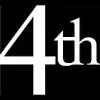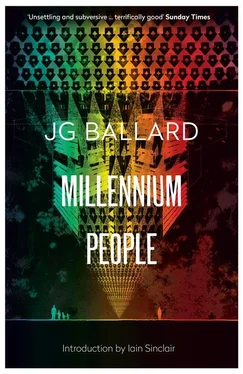Millennium People
J.G. Ballard

 Copyright
Copyright
This novel is entirely a work of fiction. The names, characters and incidents portrayed in it are the work of the author’s imagination. Any resemblance to actual persons, living or dead, events or localities is entirely coincidental.
Fourth Estate
An imprint of HarperCollins Publishers Ltd. 1 London Bridge Street London SE1 9GF www.harpercollins.co.uk
First published in Great Britain by Flamingo in 2003
Copyright © J. G. Ballard 2003
J. G. Ballard asserts the moral right to be identified as the author of this work
A catalogue record for this book is available from the British Library
All rights reserved under International and Pan-American Copyright Conventions. By payment of the required fees, you have been granted the non-exclusive, non-transferable right to access and read the text of this ebook on-screen. No part of this text may be reproduced, transmitted, down-loaded, decompiled, reverse engineered, or stored in or introduced into any information storage and retrieval system, in any form or by any means, whether electronic or mechanical, now known or hereinafter invented, without the express written permission of HarperCollins ebooks
HarperCollins Publishers has made every reasonable effort to ensure that any picture content and written content in this ebook has been included or removed in accordance with the contractual and technological constraints in operation at the time of publication
Source ISBN:9780006551614
Ebook Edition © APRIL 2010 ISBN: 9780007371907
Version: 2017-01-04
Title Page
Copyright
1 The Rebellion at Chelsea Marina
2 The Heathrow Bomb
3 ‘Why Me?’
4 The Last Rival
5 Confrontation at Olympia
6 Rescue
7 Odd Man Out
8 The Sleepwalkers
9 The Upholstered Apocalypse
10 Appointment with a Revolution
11 The Heart of Darkness
12 The Video Store
13 A Neuroscientist Looks at God
14 From Guildford to Terminal 2
15 The Depot of Dreams
16 The Children’s Sanctuary
17 Absolute Zero
18 Black Millennium
19 The Siege of Broadcasting House
20 White Space
21 The Kindness of Light
22 A Visit to the Bunker
23 The Last Stranger
24 The Defence of Grosvenor Place
25 A Celebrity Murder
26 A Wife’s Concern
27 The Bonfire of the Volvos
28 Vital Clues
29 The Long-term Car Park
30 Amateurs and Revolutions
31 The Sentimental Terrorist
32 A Decline in Property Values
33 Giving Himself to the Sun
34 A Task Completed
35 A Sun Without Shadows
Keep Reading
Works by J.G. Ballard
About the Publisher
1 The Rebellion at Chelsea Marina
A SMALL REVOLUTION was taking place, so modest and well behaved that almost no one had noticed. Like a visitor to an abandoned film set, I stood by the entrance to Chelsea Marina and listened to the morning traffic in the King’s Road, a reassuring medley of car stereos and ambulance sirens. Beyond the gatehouse were the streets of the deserted estate, an apocalyptic vision deprived of its soundtrack. Protest banners sagged from the balconies, and I counted a dozen overturned cars and at least two burnt-out houses.
Yet none of the shoppers walking past me showed the slightest concern. Another Chelsea party had run out of control, though the guests were too drunk to realize it. And, in a way, this was true. Most of the rebels, and even a few of the ringleaders, never grasped what was happening in this comfortable enclave. But then these likeable and over-educated revolutionaries were rebelling against themselves.
Even I, David Markham, a trained psychologist infiltrated into Chelsea Marina as a police spy – a deception I was the last to discover – failed to see what was going on. But I was distracted by my unusual friendship with Richard Gould, the hard-working paediatrician who was the leader of the revolt – the Doctor Moreau of the Chelsea set, as our shared lover, Kay Churchill, christened him. Soon after our first meeting, Richard lost interest in Chelsea Marina and moved on to a far more radical revolution, which he knew was closer to my heart.
I approached the crime-scene tapes that closed the King’s Road entrance to the estate, and showed my pass to the two policemen waiting for the Home Secretary’s arrival. The driver of a florist’s delivery van was arguing with them, pointing to a large display of arum lilies on the seat beside him. I guessed that a local resident, some happily married solicitor or account executive, had been too busy with the revolution to cancel his wife’s birthday bouquet.
The constables were unmoved, refusing to let the driver into the estate. They sensed that something deeply suspect had taken place in this once law-abiding community, an event that required the presence of a cabinet minister and his retinue of worthies. The visitors – Home Office advisers, concerned churchmen, senior social workers and pyschologists, including myself – would begin their tour at noon, in an hour’s time. No armed police would guard us, on the safe assumption that a rebellious middle class was too well mannered to pose a physical threat. But, as I knew all too well, that was the threat.
Appearances proved nothing and everything. The policemen waved me through, barely glancing at my pass. Having been harangued for weeks by articulate mothers in the scruffiest jeans, they knew that my fashionable haircut, courtesy of BBC make-up, dove-grey suit and sunbed tan ruled me out as a native of Chelsea Marina. The residents would die rather than resemble a minor television guru, a renegade intellectual from the dubious world of video-conferencing and airport seminars.
But the suit was a disguise, which I had put on for the first time in six months, after stuffing my torn leather jacket and denims into the dustbin. I sprang lightly over the crime-scene tapes, far fitter than the policemen guessed. The ‘terrorist actions’, as the Home Secretary termed them, had soon toughened up a lazy physique softened by years of boarding lounges and hotel atriums. Even my wife Sally, forever tolerant and never surprised, was impressed by my muscular arms as she counted the bruises left by scuffles with police and security guards.
But a disguise could go too far. Catching sight of myself in the broken windows of the gatehouse, I loosened the knot of my tie. I was still unsure what role I was playing. Richard Gould and I had been seen together so often, and the constables should have recognized me as the chief accomplice of this hunted terrorist. When I waved to them they turned away, scanning the King’s Road for the Home Secretary’s limousine. I felt a pang of disappointment. For a few seconds I had wanted them to challenge me.
In front of me lay Chelsea Marina, its streets empty as never before in its twenty-year existence. The entire population had vanished, leaving a zone of silence like an urban nature reserve. Eight hundred families had fled, abandoning their comfortable kitchens, herb gardens and book-lined living rooms. Without the slightest regret, they had turned their backs on themselves and all they had once believed in.
Beyond the rooftops I could hear the west London traffic, but it faded as I walked down Beaufort Avenue, the estate’s main thoroughfare. The vast metropolis that surrounded Chelsea Marina was still holding its breath. Here the revolution of the middle class had begun, not the uprising of a desperate proletariat, but the rebellion of the educated professional class who were society’s keel and anchor. In these quiet roads, the scene of uncountable dinner parties, surgeons and insurance brokers, architects and health service managers, had built their barricades and overturned their cars to block the fire engines and rescue teams who were trying to save them. They rejected all offers of help, refusing to air their real grievances or to say whether any grievances existed at all.
Читать дальше


 Copyright
Copyright










